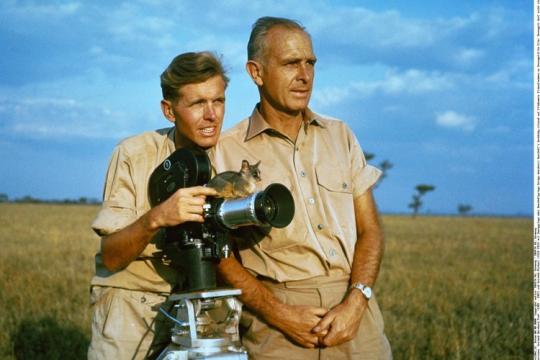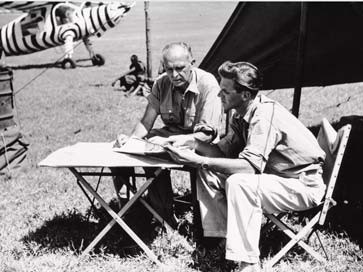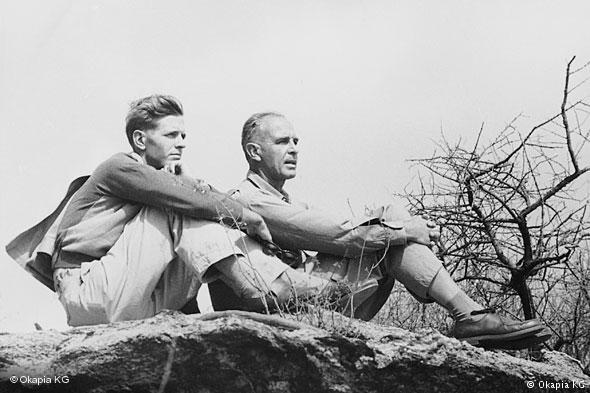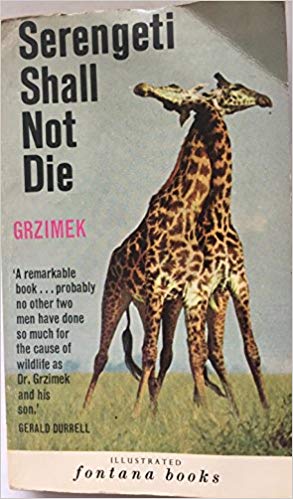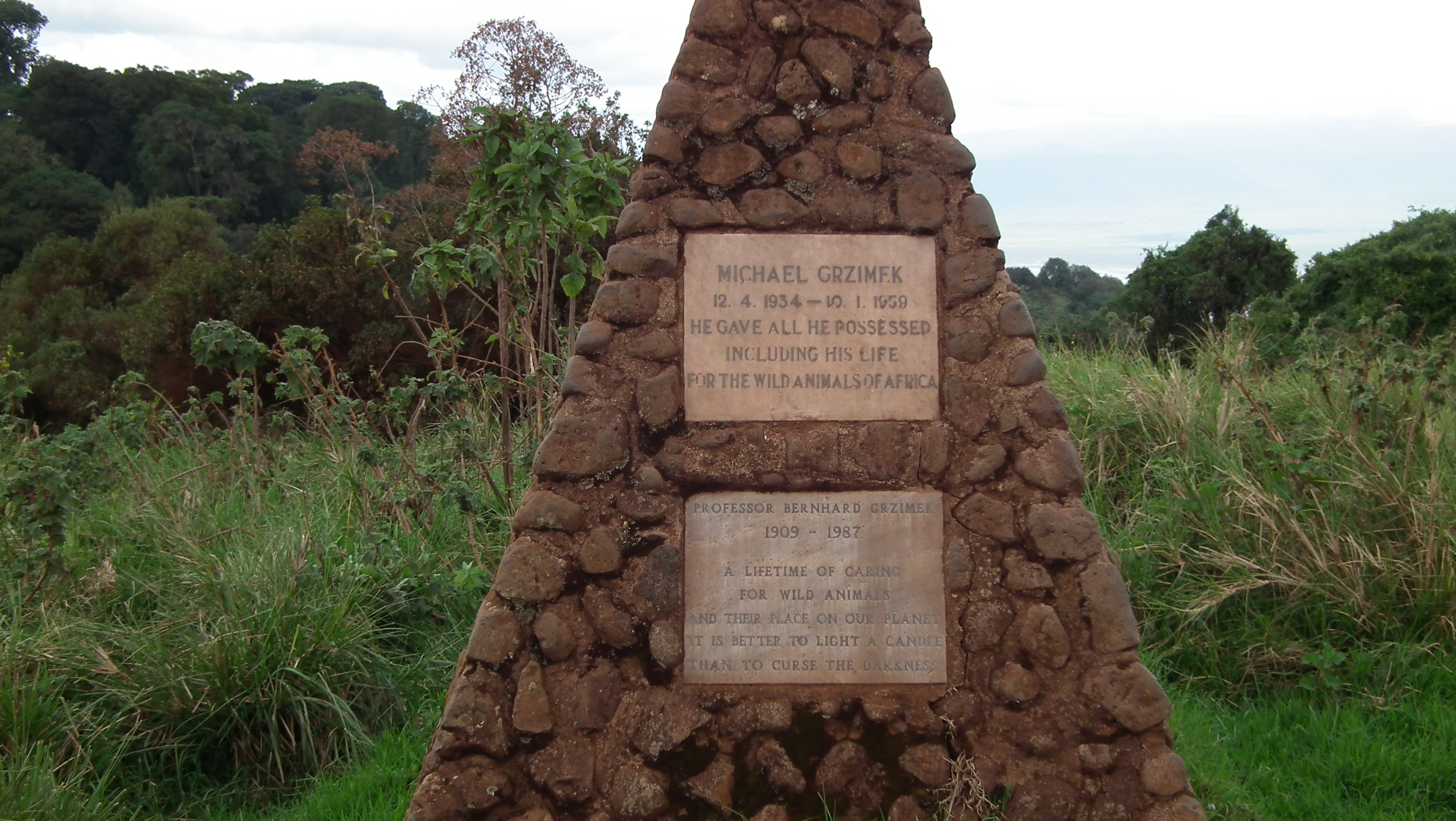Bernard Grzimek
Researcher and author
Professor Bernard Grzimek (1909-1987)- Serengeti Shall Not Die
Filmmaker | Zoologist | Conservationist
George Adamson, co-raiser of Elsa the lioness, and husband of "Born Free" author Joy Adamson, visited the Serengeti in the early sixties and describes the experience in "Pride and Joy", his autobiography. At this time he considered it probably the greatest of all game reserves in Africa and one man was mainly responsible - Bernhardt Grzimek, Director of Frankfurt Zoo. The Serengeti had suffered terribly from over-zealous hunting in the 1930's and from large-scale killing of game during the World War II. Grzimek applied himself to the tensions between the Maasai’s need for grazing. and the indigenous wildlife. He and his son carried out a massive survey, using planes to quantify the game, and identifying and logging the plantlife. He used his best-seller "Serengeti Shall Not Die" to raise funds and publicise the exercise. Thanks to the Grzimeks, and to John Owen who established a renowned scientific research establishment there, the Serengeti still has an amazing concentration of wildlife to this day.
Courtesy: Wikipedia
Grzimek was born in Neisse (Nysa), Prussian Silesia. After studying veterinary medicine in 1928, first at Leipzig and later in Berlin, Grzimek received a doctorate in 1933. He married Hildegard Prüfer on 17 May 1930 and had three sons: Rochus, Michael, and an adopted son, Thomas.
During World War II he was a veterinarian in the Wehrmacht and worked for the Reichsernährungsministerium (Food Ministry of the 3rd Empire) in Berlin. In early 1945, the Gestapo raided Grzimek's Berlin apartment, because he had repeatedly supplied food to hidden Jews. Grzimek then fled from Berlin to Frankfurt, which was occupied by the U.S. Army. In April 1945 he was appointed police chief of Frankfurt by U.S. authorities, but he refused the job.In late 1947, Grzimek was accused of membership in the NSDAP by the U.S. military government, which he denied. He was then removed from office in the Frankfurt Zoo (see below), fined, and sent for denazification. On 23 March 1948, it was determined that he was innocent (Category 5; Exonerated). He was then reinstated at the Zoo by the U.S. government but his reputation was besmirched. The Zoo Director of Munich, Heinz Heck, led a private smear and lawsuit campaign against him. Grzimek was acquitted of any wrongdoing in 1949.
Grzimek became director of the Frankfurt Zoological Garden on 1 May 1945. The zoo then in ruins and all but 20 animals killed, he prevented the permanent closure of the Frankfurt Zoo and the relocation of the "Center Zoo" to the suburbs. The Zoo reopened on 1 July 1945, after all bomb craters were filled and buildings temporarily restored. With festivals, dances and actors, Grzimek attracted the Frankfurt population and received the assent of the Provisional Government and the U.S. military to continue the Frankfurt Zoo. Grzimek led the Frankfurt Zoo for 29 years, until his retirement on 30 April 1974. He made it into one of the largest zoological gardens in Germany. At the same time he served as president of the Frankfurt Zoological Society for over forty years. The society - organized on similar principles as its London and New York counterparts - runs a number of wildlife conservation projects both in Germany and overseas; most well-known is its ongoing work in the Serengeti ecosystem in Tanzania, East Africa.
In 1954 he founded the image agency Okapia, specialized in animals and nature. Today, the agency specializes in science and employs 650 photographers. The firm is led by Christian Bernhard Grzimek, the son of his son who died in the Serengeti.
Grzimek is most famous for the work he undertook for the conservation of the Serengeti. He spent several years studying the wildlife there along with his son Michael Grzimek, especially on areal observation and counts of large scale annual migrations. The documentary film Serengeti Shall Not Die was written and directed by Bernard and Michael Grzimek and won the Academy Award for Documentary Feature in 1959. In the same year Michael was killed in an air crash while flying the Dornier Do 27 due to a collision with a griffon vulture. Grzimek wrote a best-selling book, Serengeti Shall Not Die, which first appeared in German in 1959 and later in 20 other languages. It appealed enormously to the public and was key in driving the creation of the Serengeti National Park.
He prophesied in his book:
Large cities continue to proliferate. In the coming decades and centuries, men will not travel to view marvels of engineering, but they will leave the dusty towns in order to behold the last places on earth where God’s creatures are peacefully living. Countries which have preserved such places will be envied by other nations and visited by streams of tourists. There is a difference between wild animals living a natural life and famous buildings. Palaces can be rebuilt if they are destroyed in wartime, but once the wild animals of the Serengeti are exterminated no power on earth can bring them back.
PUBLICATIONS
Grzimek was the editor-in-chief of (and author of a number of articles in) a massive and monumental encyclopedia of animal life. After publication in Germany in 1968, Grzimek's Animal Life Encyclopedia was translated into English and published in 1975 in 13 volumes (covering lower life forms, insects and other invertebrates, fish, amphibia, reptiles, birds and mammals) plus three additional volumes on Ecology, Ethology and Evolution. The 1975 work was issued in both hardback and less expensive paperback editions and became a standard reference work. After Grzimek's death, the volumes on mammals were revised, and republished in both German and then in English. In 2004, the entire encyclopedia was revised and published in a new and expanded edition with Michael Hutchins as the new editor in chief. All the versions of the encyclopedia are marked by clear and forceful prose, extensive use of illustrations (both drawings and color plates), and a deep love and concern for animal conservation. Of national importance were his work as co-editor (together with Austrian Nobel-prize winner Konrad Lorenz) of the then-largest popular magazine on animals and wildlife in German language, Das Tier (German for "The Animal") and of a very popular television series on wildlife. He also authored a large number of popular books based on his countless experiences with animals which he raised since his student days, managed as zoo director, and encountered in the wild during many research trips.
SUMMARY
Bernhard Grzimek was a renowned Silesian-German zoo director, zoologist, book author, editor, and animal conservationist in post-war Germany. He was the Director of the Frankfurt Zoological Garden for almost 30 years, and the president of the Frankfurt Zoological Society for over 40 years. The society – organised on similar principles as its London and New York counterparts – runs a number of wildlife conservation projects both in Germany and overseas; most well known is its ongoing work in the Serengeti ecosystem in Tanzania.
Grzimek was instrumental in creating and expanding the Serengeti National Park, following his documentary film “Serengeti shall not die”, for which he won an Academy Award in 1959.
Grzimek died in Frankfurt in 1987, falling asleep while watching a circus performance with a group of children. His ashes were later transferred to Tanzania and buried next to his son Michael on the rim of the Ngorongoro Crater.
Go back to: Early conservationists
AWARDS & HONOURS
1956: 2 Golden Bear´s for Kein Platz für wilde Tiere in the categories International Documentary and Audience Award
1956: German Film Award for Kein Platz für wilde Tiere 1959: Golden Screen for the television program Ein Platz für Tiere 1960: Academy Award (Oscar) for Serengeti Shall Not Die in the category Documentary 1960: Honorary Professor at the Veterinary Faculty Justus-Liebig-Universität Gießen 1960: Honorary doctorate from Humboldt University of Berlin, "Dr. met. vet. h. c." 1960: Honorary Member of the Scientific Society of Veterinary Medicine of the GDR (WGV) 1963: Gold Medal from New York Zoological Society for "outstanding services in conservation of nature" 1964: Wilhelm Bölsche-Medal for services to the dissemination of science in Germany 1968: Tie Man of the Year 1969: Grand Federal Cross of Merit 1969: Goldene Kamer (German Film & Television Award) 1973: Bambi Award 1978: Inauguration of the new nocturnal animal house in the Frankfurt Zoo under the name Grzimek-House 1981: Honorary Professor of Lomonosov University (Moscow, Russia) 2008: Renaming of a portion of the Frankfurt street Am Tiergarten in Bernhard-Grzimek-AlleeARTICLES OF INTEREST
The African adventures of Bernhard Grzimek By Ryan Green, Travel Writer 2014.
